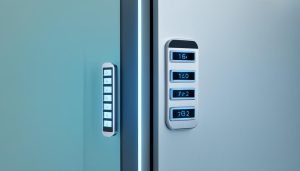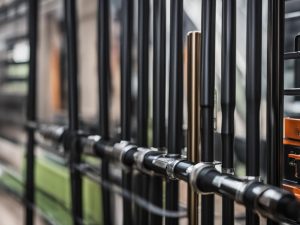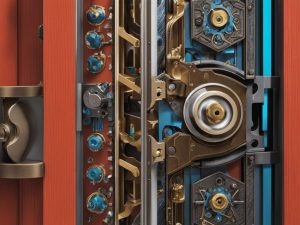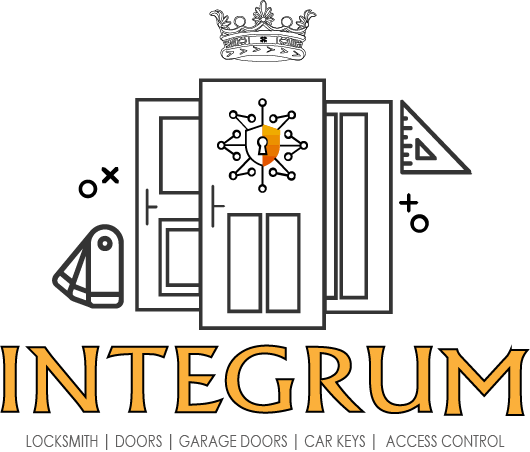Dealing with door lock problems can be a real headache for homeowners and commercial property owners. However, it’s crucial to address these issues promptly to prevent further damage and costly repairs. In many cases, calling a professional locksmith can save you both time and money in the long run. At Rapid Locksmith Ottawa, we have extensive experience in handling all types of lock repairs. While this comprehensive troubleshooting guide aims to help you resolve common lock issues on your own, feel free to reach out to us at 1-844-228-4012 if you require professional assistance.
Types of Door Locks
In both residential and commercial settings, various types of door locks are commonly used. Understanding the different options available can help you choose the right lock for your specific needs. The most popular types of door locks include:
1. Deadbolt Locks
Deadbolt locks are known for their excellent security features and are commonly used on exterior doors. They have a solid metal bolt that extends into the door frame, making them resistant to forced entry. Deadbolt locks come in single-cylinder and double-cylinder varieties, with the latter requiring a key to unlock from both sides.
2. Mortise Locks
Mortise locks are often found on commercial doors due to their high level of durability. They consist of a lock body that is installed inside the door and a metal plate called the mortise that houses the locking mechanism. Mortise locks are more complex and offer enhanced security compared to other types of locks.
3. Cylinder Locks
Cylinder locks, such as knob locks and lever locks, are commonly used in residential settings. They are easy to install and operate and offer a moderate level of security. These locks have a cylinder that houses the locking mechanism and can be rekeyed or replaced without changing the entire lock.
| Lock Type | Security Level | Common Use |
|---|---|---|
| Deadbolt Locks | High | Exterior doors |
| Mortise Locks | Very high | Commercial doors |
| Cylinder Locks | Moderate | Residential doors |
Troubleshooting Door Locks
When it comes to door lock issues, there can be a variety of problems that homeowners and property owners may encounter. From a door that won’t latch to a broken lock or a jammed door latch, these issues can be frustrating and inconvenient. However, many of these problems can be resolved with some simple troubleshooting steps.
Misaligned Door Locks
One common issue is misaligned door locks, which can prevent the latch from lining up with the strike plate and cause the door not to latch properly. To troubleshoot this problem, you can try adjusting the strike plate or the latch itself. Sometimes, a minor adjustment can solve the issue and allow the door to latch properly.
Loose Doorknob
If you have a loose doorknob, it can be fixed by tightening the screws that hold it in place. In some cases, the problem may be with the spindle, which can be replaced. By ensuring the doorknob is secure, you can ensure smooth operation and prevent further damage.
Frozen Lock
During cold Canadian winters, frozen locks can be a common problem. To resolve this issue, you can use a lock de-icer or a lubricant specifically designed for locks. Applying these products can help thaw the lock and restore its functionality.
Door Won’t Close Properly
If your door won’t close properly, it could be an issue of door alignment or improper installation. To troubleshoot this, you can check if the door is correctly aligned within the frame and adjust it if necessary. Properly aligned doors ensure a secure closure and enhance the overall security of your property.
Broken Key in the Lock
Having a broken key in the lock can be a challenging situation. It’s important not to try forcing the key out as it may cause further damage. In this case, it’s best to seek the assistance of a professional locksmith who has the experience and tools to safely extract the broken key from the lock without causing any additional problems.
Entire Cylinder Lock Turning
If you notice that the entire cylinder lock is turning instead of just the key, it may indicate a loose or broken screw. Tightening the set screw or replacing any broken screws can help restore the lock’s proper functionality.
Jammed Door Latch
Jammed door latches can often be resolved by cleaning and lubricating the lock. Over time, dirt, debris, and lack of lubrication can cause the latch to become stuck. By cleaning and applying lubricant to the lock mechanism, you can ensure smooth operation and eliminate any sticking issues.
Remember, if you’re not comfortable troubleshooting or addressing these door lock issues on your own, it’s always best to consult a professional locksmith. They have the expertise and knowledge to handle complex lock problems and ensure the security of your home or property.
DIY Tips for Door Lock Repair
When it comes to minor door lock issues, there are steps you can take to fix them yourself before calling a locksmith. By following these DIY tips, you can save time and money while ensuring the security of your property.
Troubleshooting Misaligned Door Locks
If your door lock is misaligned, it may not latch properly. To fix this issue, you can adjust the strike plate or the latch. Use a screwdriver to loosen the screws on the strike plate and move it slightly to align with the latch. Once aligned, tighten the screws to secure the strike plate in place. Test the door to ensure it latches smoothly.
Fixing a Loose Doorknob
A loose doorknob can be frustrating and affect the overall security of your door. To fix this problem, you can start by tightening the screws that hold the doorknob and spindle in place. If tightening the screws doesn’t solve the issue, you may need to replace the spindle. Remove the doorknob by unscrewing it and replacing the old spindle with a new one. Reassemble the doorknob, making sure it is secure and properly aligned.
Solutions for Frozen Locks
In cold weather, locks can freeze and become difficult to operate. To thaw a frozen lock, you can use a lock de-icer or a lubricant. Apply the de-icer or lubricant directly into the lock and wait for a few minutes. Use a key to gently insert and turn it to loosen the frozen mechanism. Repeat the process if necessary until the lock is functioning smoothly.
Repairing Door Alignment for Proper Closure
If your door is not closing properly, it may be due to misalignment. Ensure that the door and frame are correctly aligned by adjusting the hinges. Tighten or loosen the screws on the hinge plates to shift the door vertically or horizontally. Test the door to see if it closes smoothly. If needed, further adjustments can be made to achieve proper alignment.
Removing a Broken Key from a Lock
If a key breaks inside the lock, you can try removing it yourself before calling a locksmith. Use needle-nose pliers to carefully grip the broken key fragment and gently pull it out of the lock. If the broken key is difficult to reach or remove, you may need to disassemble the lock for better access. Take caution when disassembling the lock and ensure you have the necessary tools and knowledge to reassemble it correctly.
Fixing an Entire Cylinder Lock Turning
If the entire cylinder lock is turning without engaging the bolt or latch, it may indicate a loose or broken screw. To fix this issue, locate the set screw on the side of the lock and tighten it with a suitable screwdriver. If the set screw is missing or broken, you may need to replace it with a new screw of the appropriate size. Ensure the screw is securely tightened to prevent the cylinder from turning unnecessarily.
Fixing a Jammed Door Latch
A jammed door latch can prevent a door from opening or closing properly. To fix this issue, start by cleaning the latch and the surrounding area. Remove any debris or dirt that may be obstructing the latch mechanism. Apply a silicone-based lubricant to the latch and operate it several times to ensure smooth movement. If the latch still jams, you may need to disassemble the lock for a more thorough cleaning. Take care when disassembling and reassembling the lock to avoid causing further damage.
By following these DIY tips for door lock repair, you can address minor issues and restore the functionality of your locks. However, if you encounter complex problems or require lock replacement, it’s best to seek the assistance of a professional locksmith. Remember to prioritize the security of your property and maintain regular lock maintenance for optimal performance.
When to Call a Professional Locksmith
While DIY tips can solve minor lock issues, certain situations require professional assistance. If you have a broken door lock or a key stuck in the lock, it’s best to call a professional locksmith. Attempting to fix complex lock mechanisms can cause further damage. Professional locksmiths have the necessary tools and expertise to repair or replace locks efficiently and ensure the security of your home or property.
Replacing Door Locks
In some cases, it may be necessary to replace your door locks, especially if they are old or damaged beyond repair. Upgrading to more secure locks is also a common reason for lock replacement. When considering lock replacement, it’s essential to consult a professional locksmith who can provide guidance on the best lock options for your specific needs.
Lock replacement services are available from experienced locksmiths who specialize in both residential and commercial locks. They have the knowledge and expertise to recommend the most suitable lock types and brands for your property.
Benefits of Replacing and Upgrading Locks
There are several benefits to replacing and upgrading your door locks:
- Enhanced Security: Upgrading to modern, high-security locks can significantly improve the overall security of your home or business premises. These locks are designed with advanced features and technology to deter intruders and provide peace of mind.
- Improved Functionality: Over time, wear and tear can affect the performance of your locks. Replacing them with new ones ensures smooth operation and eliminates any potential issues such as sticking or jamming.
- Key Control and Convenience: Upgrading to new locks allows you to have better control over who has access to your property. You can choose locks that use master keys, keyless entry systems, or smart locks for added convenience and flexibility.
- Aesthetics: New locks can enhance the overall appearance of your doors. You can select locks that complement the design and style of your property, adding a touch of sophistication and elegance.
Choosing the Right Locks
When replacing your door locks, it’s crucial to choose the right ones that align with your security needs. Here are some factors to consider:
- Security Level: Assess the level of security required for your property. High-security locks with features like anti-drill, anti-pick, and anti-bump technology offer excellent protection against break-ins.
- Lock Type: Consider the different lock types available, such as deadbolts, mortise locks, or cylinder locks, and choose the one that suits your specific door and security requirements.
- Brand and Quality: Opt for reputable lock brands known for their quality and reliability. Research customer reviews and ratings to ensure you select durable and trusted locks.
- Installation: Engage a professional locksmith to handle the installation of your new locks. Proper installation is critical to ensure optimal performance and security.
Contact Our Locksmith Experts
If you are considering replacing or upgrading your door locks, our team of skilled locksmiths at Rapid Locksmith Ottawa is here to help. We offer reliable and efficient lock replacement services for both residential and commercial properties. Our locksmiths are well-versed in the latest lock technologies and can guide you in selecting the most suitable locks for your needs.
Don’t compromise on the security of your property. Contact Rapid Locksmith Ottawa at 1-844-228-4012 to schedule a lock replacement service today.
| Reasons for Lock Replacement | Benefits of Replacing and Upgrading Locks |
|---|---|
| To replace old or damaged locks | Enhanced security |
| To upgrade to more secure locks | Improved functionality |
| Key control and convenience | |
| Aesthetics |
Common Door Lock Problems and Solutions
When it comes to door lock problems, there are several common issues that homeowners and property owners encounter. Understanding these problems and their solutions can help you address them effectively and ensure the security of your property.
Misaligned Locks
One common door lock problem is misalignment, where the latch does not line up properly with the strike plate, making it difficult to open or close the door. The solution to this problem involves adjusting the strike plate or the latch, ensuring they align correctly.
Loose Doorknobs
Another issue that many people face is loose doorknobs, which can be frustrating. This problem can usually be solved by tightening the screws on the doorknob or replacing the spindle if necessary.
Frozen Locks
In cold weather, locks can freeze, making it difficult to insert or turn the key. To thaw a frozen lock, you can use a lock de-icer or carefully apply heat using a hairdryer. Lubricating the lock with graphite can also help prevent it from freezing.
Doors That Won’t Close Properly
If your door doesn’t close properly, it could be due to a problem with the lock. Ensure that the latch is aligned correctly with the strike plate and that the door is properly aligned in the frame. Adjusting the strike plate or hinges may be necessary to resolve this issue.
Broken Locks and Broken Keys
If you have a broken lock or a key stuck in the lock, it’s best to call a professional locksmith for assistance. Attempting to fix these issues yourself can lead to further damage. A locksmith will have the necessary tools and expertise to repair or replace the lock and extract the broken key safely.
Entire Cylinder Lock Turning
When the entire cylinder lock turns without unlocking the door, it typically indicates a loose or broken screw. Tightening the set screw or replacing any broken screws should fix this problem.
Jammed Door Latches
A door latch that gets stuck or refuses to open or close is a common problem. Lubricating the lock with graphite or silicone-based lubricants can often resolve this issue. Make sure to clean the lock before applying lubricant to remove any debris or dirt that might be causing the latch to jam.
| Common Door Lock Problems | Solutions |
|---|---|
| Misaligned Locks | Adjust the strike plate or latch |
| Loose Doorknobs | Tighten screws or replace the spindle |
| Frozen Locks | Use a lock de-icer or lubricate with graphite |
| Doors That Won’t Close Properly | Ensure proper door and latch alignment |
| Broken Locks and Broken Keys | Call a professional locksmith |
| Entire Cylinder Lock Turning | Tighten set screw or replace broken screws |
| Jammed Door Latches | Lubricate the lock with graphite or silicone-based lubricants |
Tips for Maintaining Door Locks
Maintaining your door locks is crucial to ensure optimal functionality and security. By following these lock maintenance tips, you can extend the lifespan of your locks and prevent issues from arising.
- Lubricate the Locks: Regularly lubricating your locks with graphite or silicone-based lubricants helps prevent sticking and ensures smooth operation. Apply a small amount of lubricant to the key and insert it into the lock, then turn it a few times to distribute the lubricant evenly.
- Keep the Locks Clean: It’s important to keep your locks clean and free from dirt, dust, and debris. Use a soft, lint-free cloth to wipe the lock surfaces and remove any buildup that might affect the lock’s functionality.
- Check and Tighten Screws: Periodically inspect the screws on your locks, especially for loose doorknobs. Use a screwdriver to tighten any loose screws to ensure the doorknob is securely attached to the lock.
If you notice any signs of wear or damage, it’s recommended to contact a professional locksmith for repairs or replacement. A locksmith can assess the condition of your locks and provide the necessary services to ensure proper functionality and security.
| Maintenance Tip | Description |
|---|---|
| Lubricate the Locks | Regularly apply graphite or silicone-based lubricants to prevent sticking and ensure smooth operation. |
| Keep the Locks Clean | Remove dirt, dust, and debris from lock surfaces using a soft, lint-free cloth. |
| Check and Tighten Screws | Inspect screws regularly and tighten them to avoid loose doorknobs. |
Taking the time to maintain your door locks can save you from potential lock issues and ensure the security of your home or property. If you need professional locksmith services or have any lock-related concerns, feel free to reach out to Rapid Locksmith Ottawa at 1-844-228-4012.
Conclusion
Dealing with door lock repair is a common challenge faced by homeowners and commercial property owners in Canada. However, having a good understanding of the different types of door locks, as well as troubleshooting common problems and following DIY tips, can empower you to tackle many lock issues on your own.
For minor lock problems such as misaligned locks, loose doorknobs, or frozen locks, you can try DIY solutions like adjusting strike plates, tightening screws, or using lock de-icers. These simple steps can often resolve the issue and save you the hassle and expense of calling for professional assistance.
However, for complex problems or lock replacements, it is always recommended to seek the help of a professional locksmith. Locksmiths have the expertise and specialized tools to handle intricate lock mechanisms and ensure proper installation. If you encounter broken locks, broken keys, or jammed door latches, contacting a professional locksmith like Rapid Locksmith Ottawa at 1-844-228-4012 is your best course of action.
Lastly, don’t overlook the importance of regular maintenance to keep your door locks in optimal condition and maintain the security of your property. Perform routine checks, lubricate locks periodically, and clean them from dirt and debris. If you notice signs of wear or damage, it’s essential to have a professional locksmith assess and repair your locks promptly. By taking these proactive steps, you can prevent potential lock issues and ensure the longevity of your door locks.
FAQ
What are the different types of door locks?
The different types of door locks commonly used are deadbolt locks, mortise locks, and cylinder locks.
What are some common door lock problems and their solutions?
Some common door lock problems include misaligned locks, loose doorknobs, frozen locks, doors that won’t close properly, broken locks, broken keys, entire cylinder lock turning, and jammed door latches. The solutions for these problems vary depending on the specific issue.
Are there any DIY tips for door lock repair?
Yes, there are some DIY tips you can try before calling a locksmith. Some tips include troubleshooting misaligned locks, tightening screws, using lock de-icers, ensuring proper door alignment, extracting broken keys, tightening set screws, and lubricating jammed door latches.
When should I call a professional locksmith?
It’s best to call a professional locksmith if you have a broken door lock, a key stuck in the lock, or if you are unable to solve a lock issue on your own. Attempting to fix complex lock mechanisms can cause further damage, so it’s recommended to seek the assistance of a professional.
Is it necessary to replace door locks?
In some cases, it may be necessary to replace door locks, especially if they are old or damaged beyond repair. Upgrading to more secure locks is also a common reason for lock replacement. It’s recommended to consult a professional locksmith for guidance on the best lock options for your specific needs.
How can I maintain my door locks?
Regular maintenance is essential to keep door locks functioning optimally. This includes lubricating locks with graphite or silicone-based lubricants, keeping locks clean and free from debris, and periodically checking and tightening screws to avoid loose doorknobs. If you notice any signs of wear or damage, contact a professional locksmith for repairs or replacement.






